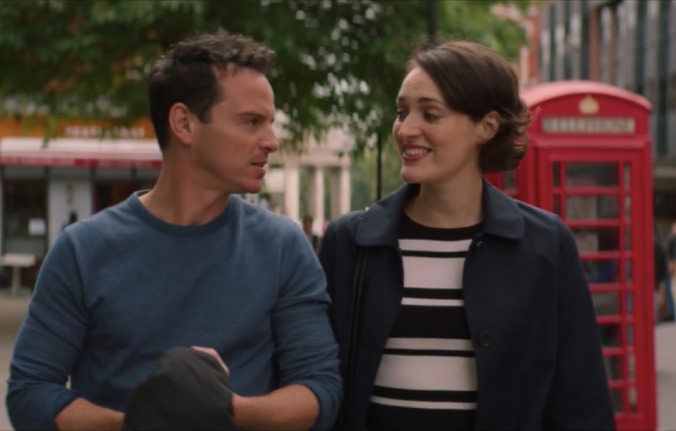Fleabag is at its best when Fleabag is at her worst


“Here’s to peace… and those who get in the way of it.”
In its second season, Fleabag has made more liberal use of the direct address—it’s been deployed in just about every situation imaginable, from a fraught and farcical dinner party to a big awards dinner to an intimate courtyard chat. When “Episode 4” begins, Fleabag can’t get through a walk down the street next to the Priest without sigh-sobbing over his arms—his arms—and his “beautiful neck” to us. After acknowledging there’s something between them in “Episode 3,” the Priest has said they can’t be more than friends. Whether or not she truly accepts those terms, Fleabag has joined him for such unromantic things as trying on holy raiments and a Quaker meeting where silence is the only thing on the agenda. But such ostensibly platonic activities take on a different hue when they’re carried out by two people with such obvious chemistry. Modeling clothes just accentuates the Priest’s hotness, and even the Quaker gathering where everyone is instructed to hold their peace unless they are moved to speak turns out to be surprisingly “erotic,” in Fleabag’s own estimation.
Fleabag has been living in some state of denial or self-denial for the duration of the time we’ve known her (or rather, been allowed these frequent glimpses into her world), so it’s not that surprising that she’d get inadvertently turned on in a setting where a form of abstinence is being practiced at the exact same time that release (the verbal kind) is encouraged so long as you feel you compelled to speak. She’s mostly keyed up in this situation because of her feelings for the Priest, but it’s also possible to view this Quaker meeting as representative of most of Fleabag’s interactions with people. Ever since her mother’s death (and possibly before), no one in her family really communicates much; they go through the motions and exchange pleasantries, but they never really get at what’s bothering or delighting them. As for Fleabag, she also tries to go along with these repressed family gatherings, but something always bubbles up and comes pouring out of her mouth.
“Episode 4” spends most of its time in the present focusing on Fleabag and the Priest, limiting her family’s appearances to glimpses of her past. Along with frequent asides, this episode is the most flashback-heavy of the series; or at least, it features the longest, most cogent look back. The trip down memory lane is shot with a documentarian’s clarity, piecing together one of the worst days in Fleabag’s life, and it’s triggered by something only she (and other similarly emotionally unavailable people) would find traumatizing: someone expressing a sincere desire to get to know her better. After spending a lovely day together that was anything but flirtation-free, Fleabag brings the Priest to Hilary’s, the guinea pig-themed café she started with Boo. She’s clearly ambivalent about the whole thing; although she wants to spend time with the Priest, he’s going beyond her comfort zone when it comes to personal revelations. Fleabag parries nearly all of his questions with queries of her own, but she can’t keep that up forever. So when he admits that he’s just trying to get to know her, she reflexively says she doesn’t want that. Turns out, she can hold her tongue around others so long as the subject is her true self.
The extended flashback that follows offers some of the most wrenching and revealing moments in the series. Fleabag takes us back to the day of her mother’s funeral, when Godmother was already trying to get her claws into Dad and Boo was still alive. Harry is also still in Fleabag’s life, as fitfully supportive as he was last season, and Claire is scolding Fleabag. Everything is as it should be, aside from Fleabag looking better than she ever has. Phoebe Waller-Bridge makes more granular observations about the grieving process here, and the most palatable ways to perform it. There is a narrow window when people are allowed to look and feel their worst with no judgment from others, but once it closes, you’d better get it together or you’ll just make your friends and acquaintances uncomfortable. Fleabag could look terrible right now—in fact, she should—but her radiant complexion and hair that just keeps falling in this incredibly chic way have a mind of their own.
The flood of compliments that Fleabag gets at the funeral gives a whole new meaning to receiving line, and Waller-Bridge’s increasingly matter-of-fact response to being told she looks amazing at such a low point makes for some divine comedy. But the protracted flashback also establishes something hugely significant, which is what (beyond her mother’s death) set Fleabag on the self-destructive path she was on when we first met her. First, Claire makes her feel like she’s getting everything wrong: She not only looks far too pretty for someone in mourning, but she has too much of an appetite and is too focused on sex. At the funeral, Godmother warns Fleabag and Claire that they might lose some of their friends or even lovers because “it spooks them to be around someone perpetually in pain.” When she admits she doesn’t know what to do now that her mother’s gone, her father tells her to “Buck up. Smile. Charm. Off we go. We’ll be okay.”
Fleabag has taken all of these words to heart, whether she realizes it or not (Fleabag the show certainly does, though, which is the purpose for the look back). She doesn’t try harder because she’ll get everything wrong anyway. She constructs a persona who’s all “charm” and gaiety, thinking that’s what she has to offer, and maybe seeing it as some kind of tribute to her mother, to whom those qualities came naturally. She refuses to let anyone see how heartbroken she is because they might leave her, while also keeping them at arm’s length. But the loneliness is still there, the void is still there, so she has sex to feel something, anything. Fleabag’s hedonistic ways did nothing to abate the pain and loneliness, and her attempts to straighten up and fly right haven’t been much more successful either. There’s no better indicator for how at a loss she is than the fact that she goes to the Priest’s church, where she knows she won’t find spiritual guidance because she doesn’t believe in it, but where she’s also not likely to find the kind of physical comfort she’s used to seeking out. That is, until she does.
“Episode 4” is another high point for the series, finding a balance despite spending more time in Fleabag’s memories than any other entry, and underscoring the show’s themes in the past and present, through silence and unfettered confession. What sends Fleabag back to that awful day (for everyone except her skin and hair) is having spent the day with the one person who has found his way around all the defenses she developed in its wake. The Priest has shown himself to be the only person who sees her completely, which is how he’s able to break the fourth wall with her this episode. As the story continues and they find themselves inside the confessional booth, he proves he might also be the only person who accepts as she is.
When they kiss, it’s an incredibly charged moment, one that’s sad, sweet, and sexy (when Andrew Scott said “kneel,” I just wrote down “HOW DARE YOU”). But that moment also comes after her admission that she fears she’s made a complete mess of her life, which is one of the reasons I’m grateful for the interruption via falling painting. As much as I’d like to see these two get together, something about them doing so after Fleabag has literally begged for help getting her shit together would take some of the luster off their connection for me. God at least seems to agree.
Stray observations
- As if the throaty commands to “kneel” weren’t enough, “Episode 4” also gave us Andrew Scott holding a guinea pig:
- There are no asides in Fleabag’s flashbacks, suggesting it’s something she started to do after Boo’s death, which lends credence to theories I’ve seen about Boo being the person she’s addressing in direct address. There was more evidence in support of this theory in “Episode 4”; when Fleabag asks where she’s supposed to put all the love she has for her mother, Boo says she’ll take it. If that’s the way Fleabag saw things, then she’d feel even worse about indirectly causing Boo’s death, because her best friend had also become a kind of conduit for her love for her mother. Or maybe I’ve just been looking at too many pictures of guinea pigs.
- Equally Sexy Priests: Since I’m behind, I’ll give you two for the priest of one—Ben Daniels and Alfonso Herrera in Fox’s The Exorcist.